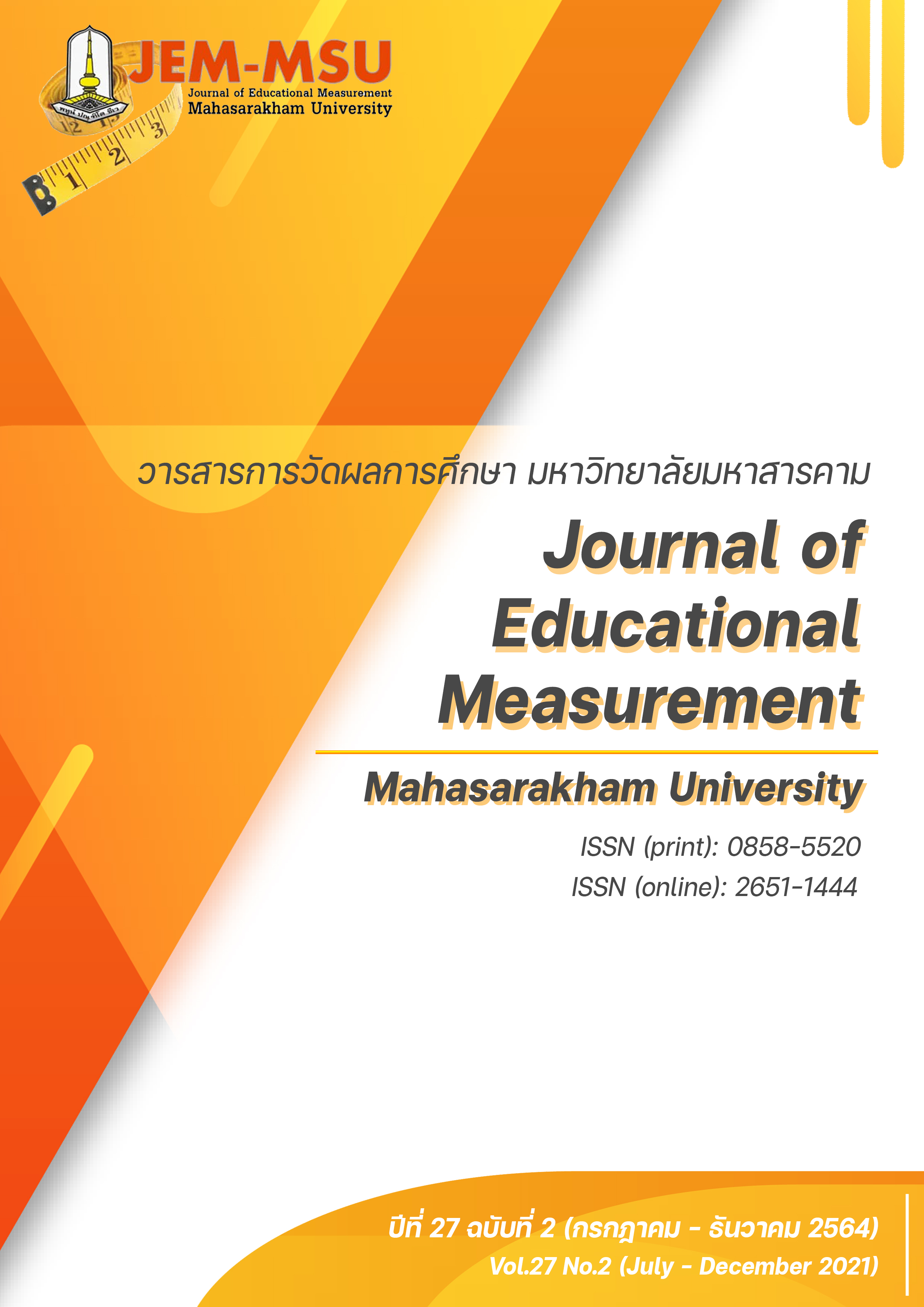Application of Item Response Theory in Development of the Item Bank of Basic Knowledge in Physical Education
Main Article Content
Abstract
The purpose of this research was to develop and validate the quality of an item bank of basic knowledge in physical education, using the two-parameter Item Response Theory. The sample consisted of 514 students in the Physical Education Programs, Faculties of Education, of Rajabhat Universities in the Northeast, Thailand in the academic year 2020, who performed a test in the program system on the web browser. The research instrument was a 5-choice test, having the content validity of the test items checked by 5 experts, three of whom were in physical education and the other two in measurement and evaluation. The data were analyzed for test parameters according to the Item Response Theory using the R program by ltm, Lavaan, Psych, and GPArotation packages. The research findings revealed that the item bank became better developed by using the PhpMyAdmin database management program; the bank could store both images and texts; there were 47 items with item difficulty appropriate for the level of basic knowledge measured. The item bank showed good item parameters with high item discrimination, and the item difficulty ranged from average to easy level with validity related to measured traits and construct validity.
Article Details
The content and information contained in the published article in the Journal of Educational Measurement Mahasarakham University represent the opinions and responsibilities of the authors directly. The editorial board of the journal is not necessarily in agreement with or responsible for any of the content.
The articles, data, content, images, etc. that have been published in the Journal of Educational Measurement Mahasarakham University are copyrighted by the journal. If any individual or organization wishes to reproduce or perform any actions involving the entirety or any part of the content, they must obtain written permission from the Journal of Educational Measurement Mahasarakham University.
References
กนกกร พวงสมบัติ สมประสงค์ เสนารัตน์ และเบญจมาภรณ์ เสนารัตน์. (2561). การพัฒนาโปรแกรมทดสอบและประเมินวินิจฉัยทักษะการแก้โจทย์ปัญหาเรื่อง การประยุกต์สมการเชิงเส้นตัวแปรเดียว. วารสารวิจัยและประเมินผลอุบลราชธานี, 7(2), 90-100.
คมสัน เอี่ยมจำรัส. (2547). การสร้างและพัฒนาโปรแกรมระบบการทดสอบ. วิทยานิพนธ์ปริญญาวิทยาศาสตรมหาบัณฑิต สาขาวิชาวิศวกรรมคอมพิวเตอร์ จุฬาลงกรณ์มหาวิทยาลัย.
เบญจมาภรณ์ เสนารัตน์, บุญชม ศรีสะอาด และจริยา ภักตราจันทร์. (2559). การพัฒนาเครื่องมือประเมินความสามารถทางการวิจัยการศึกษาของนักศึกษาครูมหาวิทยาลัยราชภัฏในภาคตะวันออกเฉียงเหนือ. วารสารการวัดผลการศึกษา มหาวิทยาลัยมหาสารคาม, 22(1), 164-182.
เบญจมาภรณ์ เสนารัตน์ และ สมประสงค์ เสนารัตน์. (2561). หลักการวัดและประเมินผลทางการศึกษา. (พิมพ์ครั้งที่ 4). มหาสารคาม: อภิชาติการพิมพ์.
ลัดดาวัลย์ ด้วงภู่ทิม และ ปัณณวิชญ์ ใบกุหลาบ. (2562). การสร้างแบบทดสอบวัดความสามารถการคิดวิเคราะห์ตามแนวคิดมาร์ซาโนสำหรับเด็กปฐมวัย สังกัดสำนักงานเขตพื้นที่การศึกษาประถมศึกษากำแพงเพชร เขต 1. วารสารวิชาการศึกษาศาสตร์ ศรีนครินทรวิโรฒ, 20(1), 57-71.
สมประสงค์ สงค์เสนารัตน์. (2561). การวิจัยทางการศึกษา, (พิมพ์ครั้งที่ 3). มหาสารคาม: อภิชาติการพิมพ์.
สมบัติ ท้ายเรือคำ. (2551).ระเบียบวิธีวิจัยสำหรับมนุษย์ศาสตร์และสังคมศาสตร์. พิมพ์ครั้งที่ 2. กาฬสินธุ์: ประสานการพิมพ์.
สุวิมล ติรกานนท์.(2548). การตรวจสอบความเป็นเอกมิติ. กรุงเทพฯ : โรงพิมพ์แห่งจุฬาลงกรณ์มหาวิทยาลัย.
ศิริชัย กาญจนวาสี. (2563). ทฤษฎีทดสอบแนวใหม่, (พิมพ์ครั้งที่ 5), กรุงเทพฯ: โรงพิมพ์แห่งจุฬาลงกรณ์มหาวิทยาลัย.
ศิริชัย กาญจนวาสี. (2552). ทฤษฎีการทดสอบแบบดั้งเดิม, (พิมพ์ครั้งที่ 6), กรุงเทพฯ: โรงพิมพ์แห่งจุฬาลงกรณ์มหาวิทยาลัย.
Brown, T. A. (2006). Confirmatory factor analysis for applied research. New York, NY, US: The Guilford Press.
Baker, Frank B. (2001). The Basics of Item Response Theory. Second Edition. Guides - Non-Classroom; ERIC Publications.
Drasgow, F. and Lissak, R. (1983) Modified parallel analysis: a procedure for examining the latentdimensionality of dichotomously scored item responses. Journal of Applied Psychology, 68, 363–373.
Drasgow, F. (1989). An evaluation of marginal maximum likelihood estimation for the two-parameter logistic model. Applied Psychological Measurement, 13, 77–90.
Embetson, S. E., & Reise, S. P. (2000). Item response theory for psychologists. Mahwah, NJ: Lawrence Erlbaum.
Harwell, M. R., & Janosky, J. E. (1991). An empirical study of the effects of small datasets and varying prior variances on item parameter estimation in BILOG. Applied Psychological Measurement, 15, 279–291.
McDonald, M. E. (2002). Systematic Assessment of Learning Outcomes: Developing Multiple-Choice Exams. Published by Jones and Bartlett Publishers
Revelle, W. (2020). Package ‘psych’. Retrieved June, 3, 2020, from https://personality-project.org/r/psych-manual.pdf.
Rosseel, Y. (2012). Lavaan: An R Package for Structural Equation Modeling. Journal of Statistical Software, 48(2), 1-36.
Stone, C. A. (1992). Recovery of marginal maximum likelihood estimates in the two-parameter logistic response model: An evaluation of MULTILOG. Applied Psychological Measurement, 16, 1–16.
Wang, C., and Chang, H. (2011). Item selection in multidimensional computerized adaptive testing-gaining information from different angles. Psychometrika, 76(3), 363-384.


